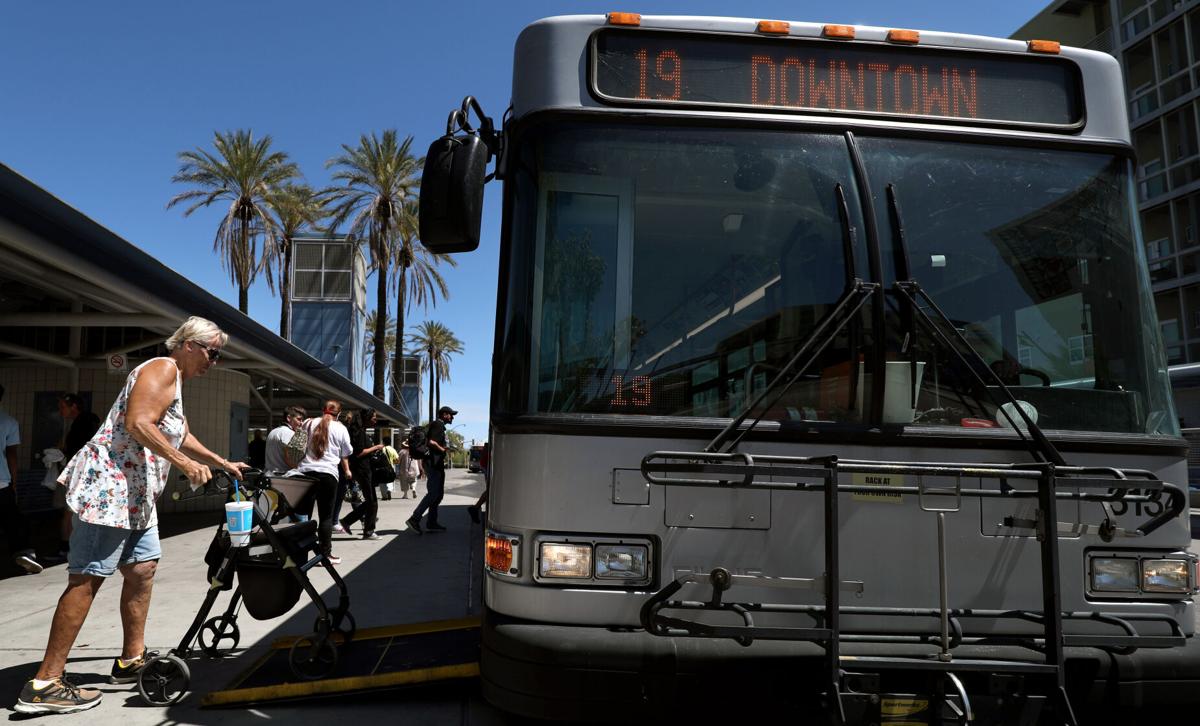Tucsonans will continue to see fare-free transit after city officials decided to extend it to the end of the year. The initiative started in 2020 as a COVID relief measure.
The Tucson City Council will make a final decision in December about whether it is viable to keep the Tucson transit system free. The decision could affect those who rely on public transportation to move around the city.
“It helps me a lot that they don’t charge,” said Enrique Valenzuela, a bus user, in Spanish.
Valenzuela said he has depended on public transportation for a year to commute to his work and home. Since rent and food prices have been rising, Valenzuela said that sometimes he doesn’t have enough money to pay for the fare.
“If they start charging again, the prices won’t be the same since gas prices are rising,” Valenzuela said.
Mayor Regina Romero and Vice Mayor Lane Santa Cruz sent a letter to City Manager Michael Ortega supporting his recommendation to keep fares free until the end of the year, but asked for a wide array of data over the past 10 years such as ridership data, safety and incident rates and staffing levels for bus drivers.
One of the key asks is to conduct research about what other jurisdictions are doing to provide fare-free transit. Replicating those strategies could influence the council’s decisions regarding funding for transit fares.
The city of Tempe’s Orbit program provides a free neighborhood circulator shuttle, which was implemented in 2007. Orbit connects people from neighborhoods to local areas like schools, major bus routes and shopping centers. It operates year-round with a 15 minutes frequency between routes. No transit pass or ID is necessary for riders.
“(Orbit) provides a much-needed service to community members who are either unable to drive or choose not to drive,” said city of Tempe spokeswoman for Transportation and Sustainability, TaiAnna Yee, in an email.
The city of Tempe has a dedicated transit tax that funds the Orbit system. The city also partnered with Arizona State University, which pays operation costs. The city of Tucson is considering working with the University of Arizona to cover operating costs as well.
Tucson, however, has more than double the City of Tempe’s population, according to Census data. The feasibility of a free-fare system for a much larger population is unclear.
Orbit costs Tempe about $9.5 million annually, and fare-free transit is estimated to cost Tucson $10 million per year.
“Orbit also supports multiple city goals, such as creating a 20-minute city, where residents can take transit to meet their daily, non-work-related needs; reducing the city’s carbon emissions; reducing congestion; and it contributes to our Vision Zero goal of eliminating traffic fatalities and serious-injury crashes,” Yee said.
How to form a sustainable, clean transit system that’s reliable for the Tucson community is not the only inquiry. There are also safety and security concerns from drivers and riders.
Local bus drivers have called for an end to free fares.
Tucson’s Teamster union released a letter May 1 asking for an end to the policy, which it blamed for a spike in crime on routes. Assaults on drivers and riders tripled between 2019 and 2021 — from 21 to 64 — while the number of vandalism incidents increased to 146, more than double what it was before fares were paused.
However, Councilmember Kevin Dahl has said that the security issues on Tucson’s public transportation and the policy of providing free fares are “separate issues... I don’t think it (safety issues) happens more because it’s free.”
Verbal assaults between riders and drivers are low when compared to the average daily boarding, according to the city’s transit administrator, Rhett Crowninshield.
Ridership has been steadily increasing over the past 12 months on all three system modes — Sun Tran, Sun Van and Sun Link — he said.
Romero said the decision about keeping the Tucson public transit system free should be data-driven.
“I would say that the security issues have been ongoing way before COVID, years before COVID,” she said.
For the past four years, Gilberto Levario, a bus user, has used the public transit system to go everywhere: work, home, grocery shopping and doctor appointments. He said fare-free transit helps those who have limited or zero income.
“I feel safe, I haven’t had any issues,” he said.





